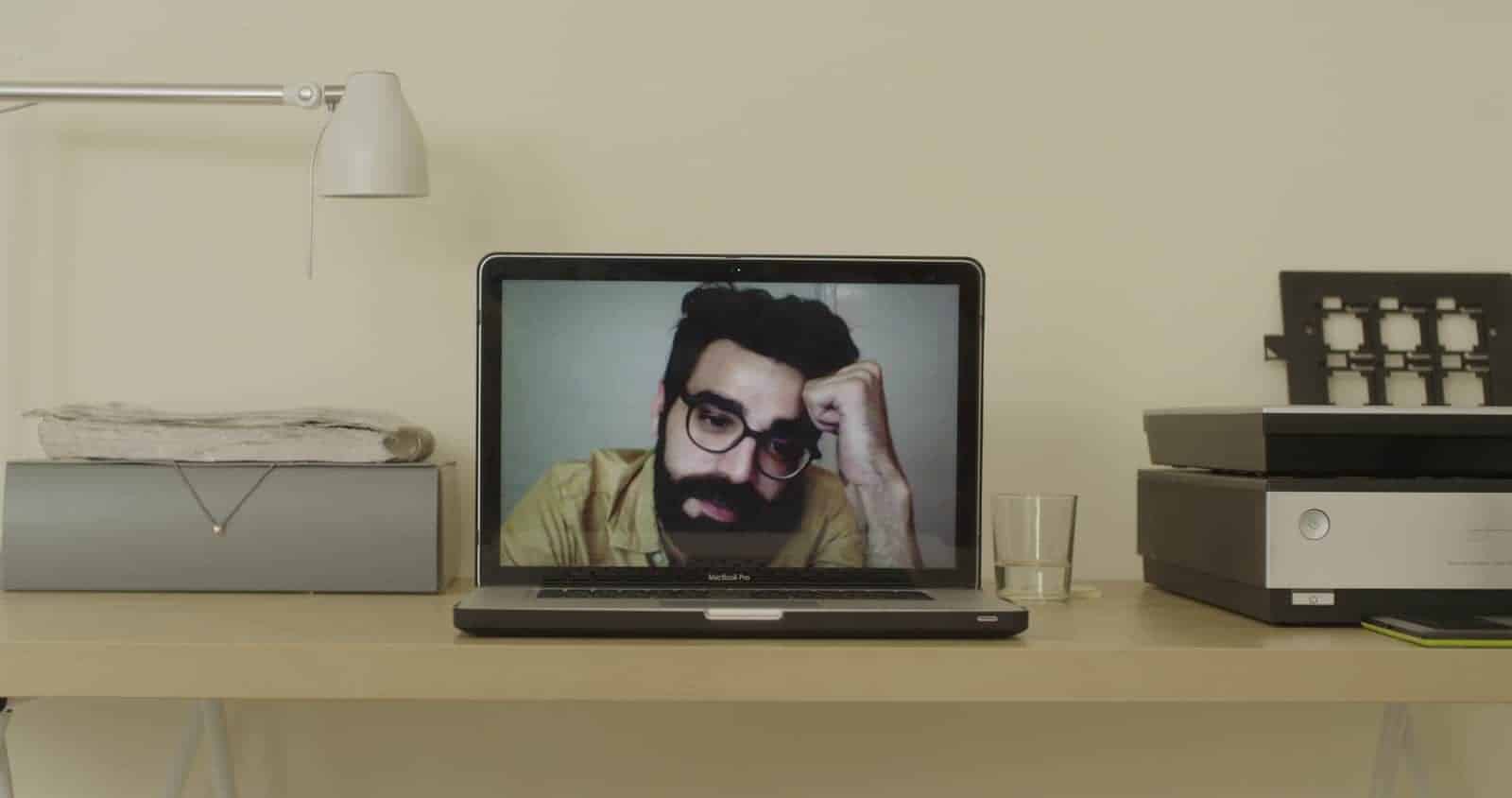This production will be screening in HD at cinemas across the US (dates vary) and in Canada on April 23 and 28, 2016. Find a Stratford Festival HD screening of Hamlet near you here.
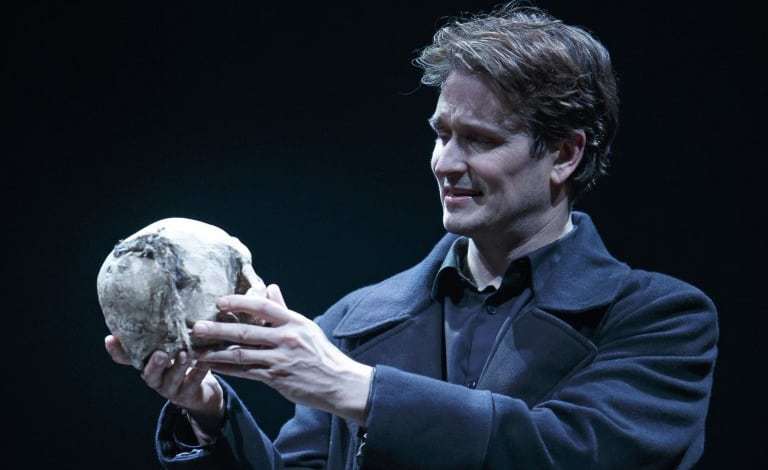
Antoni Cimolino’s production of Hamlet at the Ontario Stratford Festival takes the Bard’s masterpiece and pares it down to a tense family drama. Gone is most of the talk of Denmark as rank. Gone are the majority of the political concerns, including Hamlet talking about being the head of state, responsible for the body politic. Gone are Hamlet’s constant references to his brains and much of the meta-narrative.
Impressively, what’s been cut isn’t obvious at first glance; it wasn’t until hours after the play that I started to notice what it had lacked. No Shakespeare production is a definitive Shakespeare production. With Hamlet, especially, every directorial choice means highlighting one aspect of the play to the detriment of another. Focussing on the chamber drama aspects of the play make for a highly illuminating and intimate production, which is lucid, beautifully designed, and splendidly acted.
We first meet Hamlet (Jonathan Goad) in inky black at the garish wedding celebrations for his mother Gertrude (Seana McKenna), dressed in a striking, cleavage-bearing red dress, and his uncle Claudius (Geraint Wyn Davies). Everyone from the court is there, including Polonius (a show-stealing Tom Rooney), Ophelia (Adrienne Gould) and Laertes (Mike Shara) who stand together as a family unit on one side of the stage, a quick way to introduce the two important clans in the play.
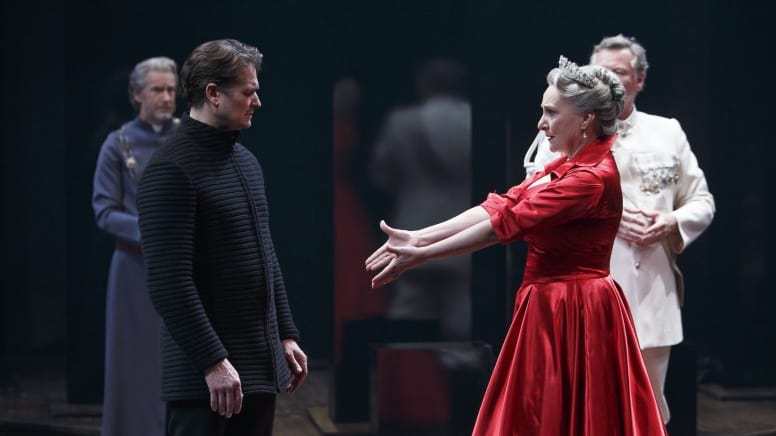
Despite Hamlet’s protestations, Claudius will not permit Hamlet to leave Denmark to return to university in Wittenberg. And given the longing, desperate looks Gertrude gives Hamlet, it’s clear that it’s at Gertrude’s behest, who wants Hamlet there to bear witness to their marriage and give them his approval. Hamlet is furious, not just because he considers his mother’s hasty marriage a betrayal, but he’s now saddled with a needy step-father, and forced to perform niceties. Gertrude and Claudius are in complete denial about what’s going on, unable to recognize that Hamlet has feelings because it might force them to feel guilty.
Siblings Ophelia and Laertes, on the other hand, have a much more functional relationship with each other and their father. When Laertes’s cautions Ophelia to be careful around Hamlet, it comes off as genuine, brotherly concern rather than patriarchal orders — it helps that Cimolino has cut the most offensive lines. But more surprising is that the bumbling, fumbling Polonius isn’t just a source of humour, for his inability to speak “more matter with less art,” but in fact a really good and loving father. There’s a great exchange between Ophelia and Laertes as they practically roll their eyes at their father — with love — hoping that he’ll get to the point and finish. But there’s affection between them all. They have everything that Hamlet doesn’t have with his mother, including mutual respect.
Both Hamlet and Ophelia are portrayed as relatively young and naive. Ophelia still eagerly kneels next to her seated father, grasping his legs, an image that Hamlet later mirrors with his father. In Cimolino’s world, Hamlet’s tragedy is what happens when parents behave selfishly, unable to see how their children are feeling. Despite his best intentions, Polonius makes the same mistake when using his daughter in a plot to uncover what’s going on with Hamlet. Cimolino’s blocking is also designed to highlight how the characters in this play come in pairs: Rosencrantz and Guildenstern; Barnardo and Francisco; the Player King and Queen; and Voltemand and Cornelius. It makes us painfully aware of how alone Hamlet and Ophelia both are as children, and how tragic it is to see them separated by circumstance.
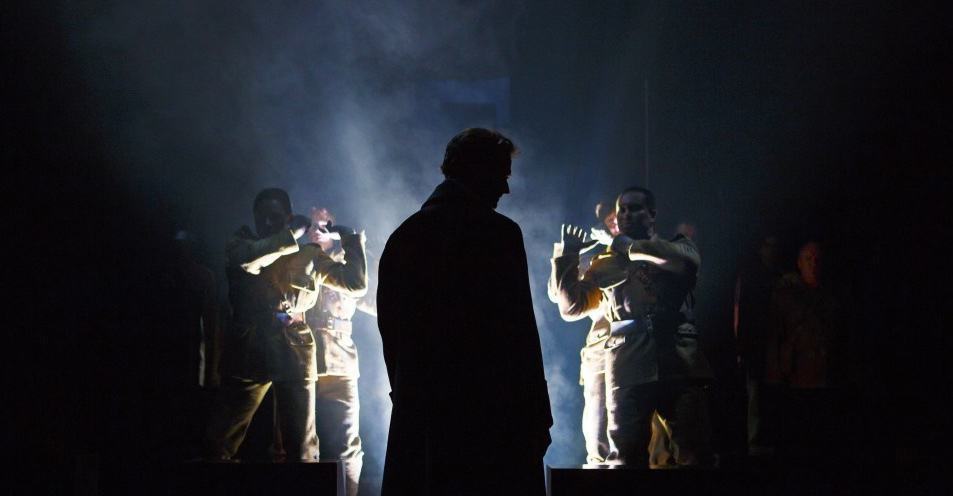
Combining a simple, flexible set by Teresa Przybyiski with terrific lighting design by Michael Walton, Cimolino crafts a realistic world and an impressive spectacle. When the ghost of Hamlet Sr. (also played by Geraint Wyn Davies) appears at night, we see him appear in a spotlight that moves across the stage, a terrifying, theatrical appearance. Here, the ghost is not a figment of Hamlet’s imagination, but very, very real. Sitting next to Hamlet on a bench, the ghost tells his son he was murdered and asks him to find vengeance. Meanwhile, Hamlet is reduced to a small boy, missing his father, grasping at his leg. The bench they’re sitting on is shiny black and one of many, which get used, in turn, as pews in a church and the foundations of a bed, among other things. It allows the play to move at a brisk pace — the scene transitions are seamless, as Cimolino creates utter blackout in parts of the stage where the set is being changed while illuminating the action elsewhere with bright lights — and allows the actors to still have a set to ground their actions.
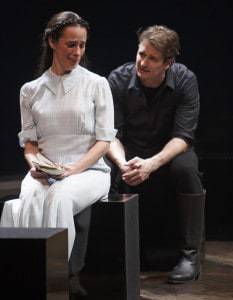
Of course, a Hamlet production lives and dies by its lead. Goad’s performance got off to a rocky start in Act I, when it often sounded more like he was repeating set speeches than speaking at the speed of thought. He was often more whiny than sardonic, too. But by the third act, Goad was in the zone, proving himself a worthy and captivating Hamlet. In Act II Scene 2, when Hamlet spouts cleverly disguised insults at Claudius, it’s done magnificently. When he sees Polonius enter on stage, he tries desperately to escape off stage from the other side, but Polonius won’t let him out of his sight. Forced to engage, his contempt comes out as excellent wit, every bit the complex Hamlet we expect.
In the text, Hamlet is juggling many balls, from his worries about playing a part to political troubles to his vengeance plot to managing his feelings for Ophelia. Because much of this is cut in the play, and his relationship with Ophelia here is rather chaste, he’s not given as much to work with to craft the character. His Hamlet may be most caught up in the family drama, but he’s still a bewitching presence who makes you see Shakespeare’s text with new eyes. It’s the mark of a great, if in this case somewhat incomplete, production.
Find a screening near you here.
We also recommend catching Stratford Festival’s Pericles in HD.

